
You have crazy dreams
The two main types of sleep that occur are rapid eye movement (REM sleep) and non-rapid eye movement (NREM sleep). “During REM sleep, the stage of sleep most associated with dreaming, there is an increase in the firing rate of most neurons throughout the brain, as compared to non-REM sleep,” according to the Division of Sleep Medicine at Harvard Medical School. There is more brain activity during REM sleep than when we are awake. Harvard reports that when people are woken up in the middle of REM sleep, they report having vivid dreams. However, people do not report having vivid dreams as frequently when awakened from NREM sleep. Thus, “the pattern of brain activity during REM sleep probably underlies the intense dreaming that occurs during this state.”
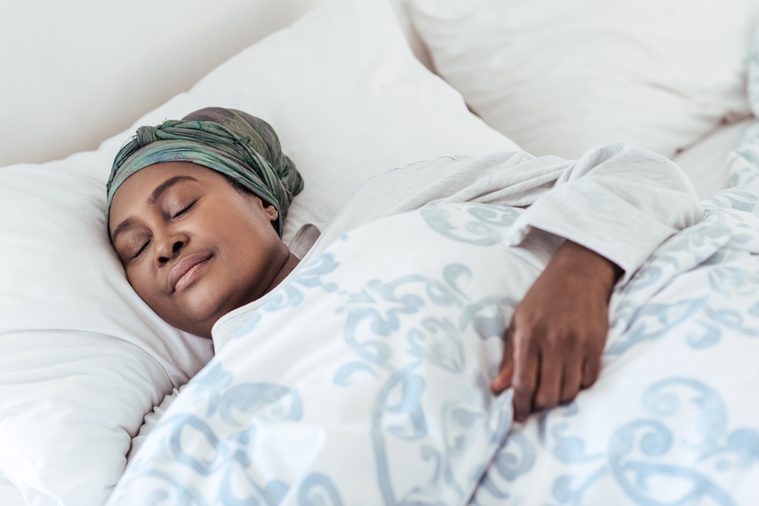
And you can have recurring dreams, too
In addition to having some crazy dreams, you can have repeat dreams as well. According to Psychology Today, 60 to 70 percent of adults have recurrent dreams. And they often indicate the presence of “an unresolved and persistent conflict in an individual’s life,” per Psychology Today. That said, not all recurring dreams are negative, Angel Morgan, MD, told huffingtonpost.com. Check out these other facts about dreams that might keep you up at night.
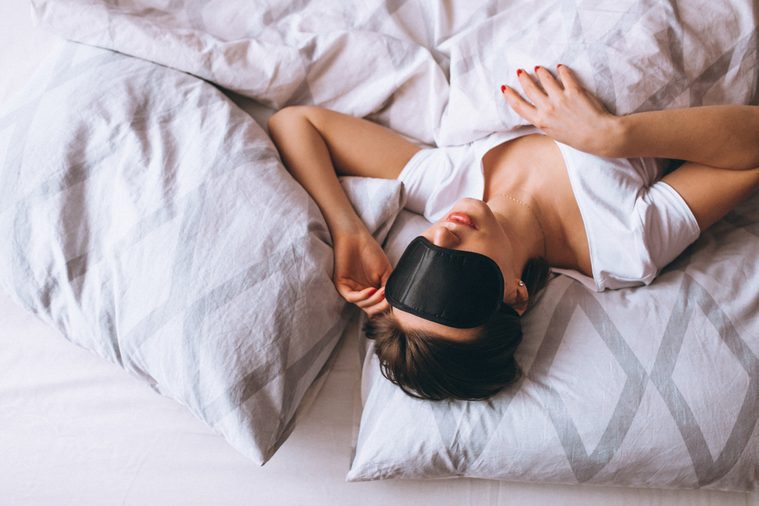
You feel like you’re falling
These involuntary twitches are called hypnic jerks, and up to 70 percent of people experience them occasionally. No one knows exactly why they occur, but according to the National Sleep Foundation, one theory suggests they happen as a result of a “natural downshifting of the nervous system that occurs as you fall asleep.” Another theory claims that the brain “misinterprets the relaxing of muscles as a sign that you’re actually falling.” Caffeine, stress, and sleep deprivation can increase the frequency of hypnic jerks.

You can sleepwalk
Sleepwalking occurs during the deepest stages of NREM sleep. That’s the part of the sleep cycle that leaves you groggy if you are woken up in the middle of it. Though no one can prove the exact causes of sleepwalking, some scientists argue that sleepwalking occurs when your brain is attempting to directly transition from deep NREM to wakefulness, rather than going through the normal sleep cycle. The National Sleep Foundation notes that that sleepwalking can be caused by stress, depression, alcohol, fever, and sleep-deprivation. Sleepwalking also seems to run in families.
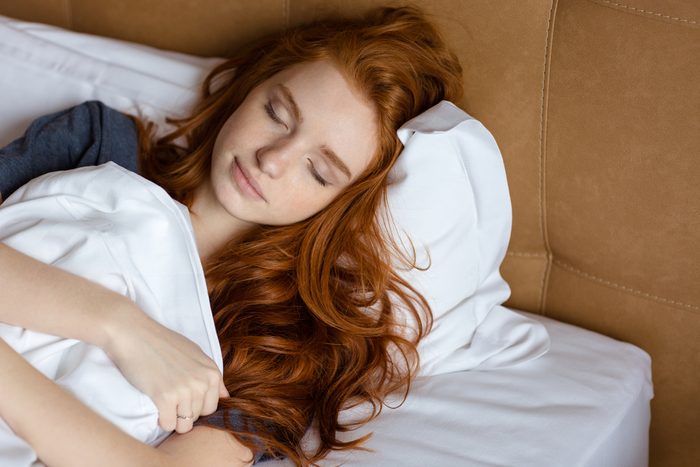
You can sleep talk
Sleep talking, also known as somniloquy, can occur during both the REM and NREM stages of sleep. Though your mouth and vocal chords are usually inactive, a “motor breakthrough” causes them to be momentarily active, which is when you may speak words out loud. Sleep talking can also occur during the transition from one stage of sleep to another. While chronic sleep talking is considered to be a sleep disorder, sporadic sleep talking is pretty common.
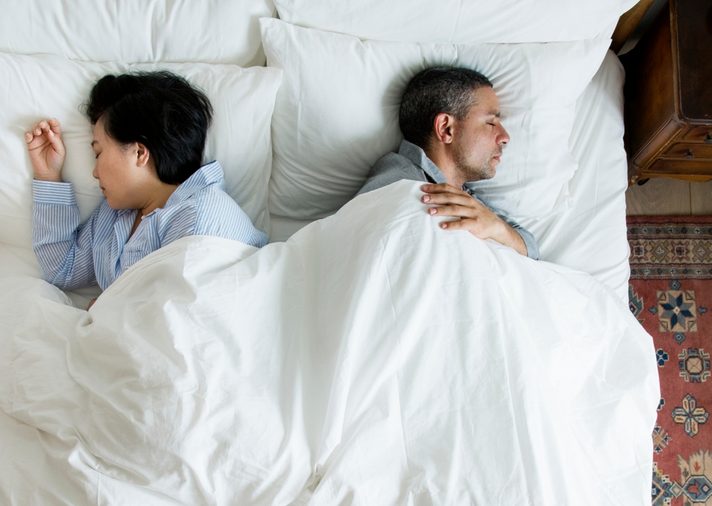
You snore
While you sleep, the muscles of your throat relax and your throat actually becomes narrower. As you breathe, the walls of your throat vibrate. These vibrations lead to the sound of snoring. According to the National Sleep Foundation, “the narrower your airway becomes, the greater the vibration and the louder you snore. Sometimes the walls of the throat collapse completely, creating a condition called apnea (cessation of breathing).” These are the things doctors wish you knew about snoring.
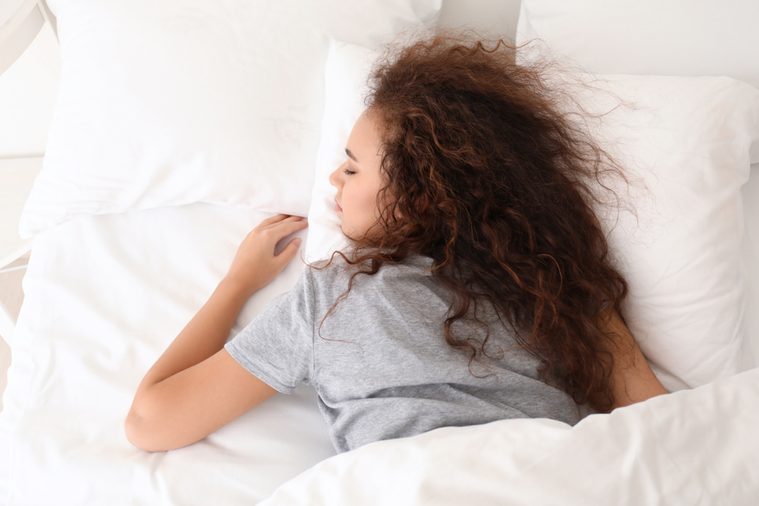
Your kidney function slows
Many physiological activities, including kidney function, slow down when you sleep. In turn, urine production is decreased. This is why you typically don’t have to go in the middle of the night. On the other hand, needing to regularly urinate in the middle of the night could be a symptom of diabetes or other health concerns.

You’re more likely to have gas
You’re more likely to pass gas when you sleep because all of your muscles are relaxed, including your anal sphincter. However, this likely won’t bother you or your partner because you’re both asleep and your sense of smell is decreased while you sleep.
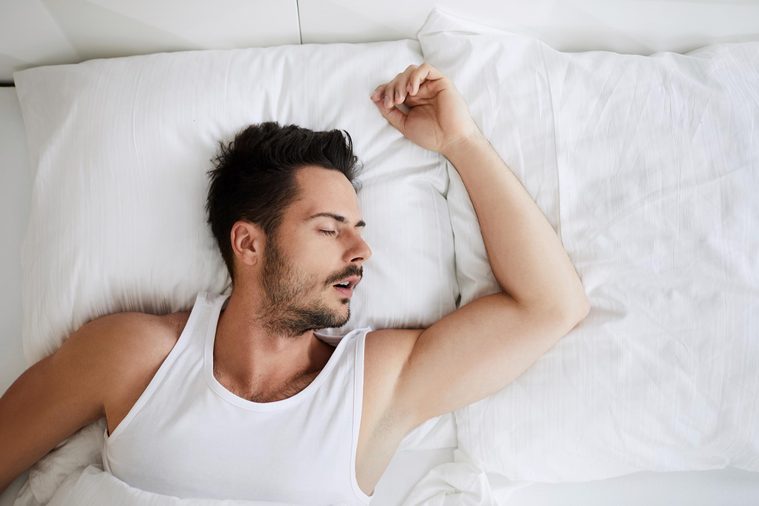
Your sense of smell is decreased while you sleep
This is why fire alarms were invented, as you can’t properly smell smoke while you’re asleep. Many studies have shown that while noise can wake you up, smells won’t. Here are some weird sleep tricks that really do work.
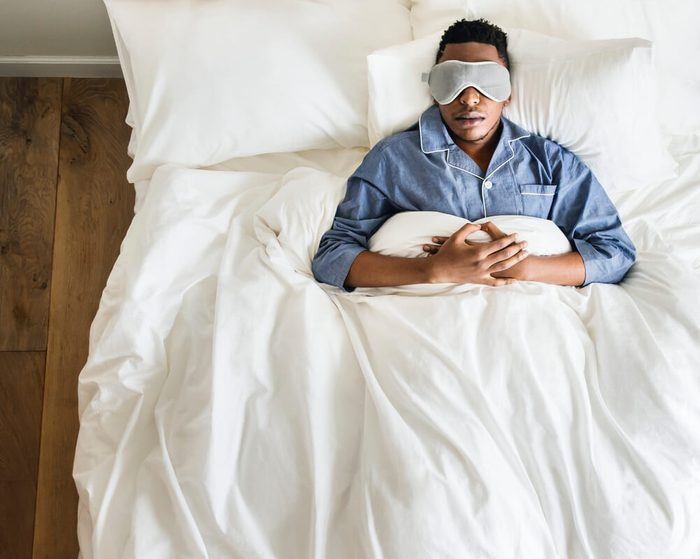
Your muscles are temporarily paralyzed
This temporary paralysis is a good thing. According to Harvard’s sleep medicine division, “Interestingly, during REM sleep muscles in the arms and legs are temporarily paralyzed. This is thought to be a neurological barrier that prevents us from ‘acting out’ our dreams.”
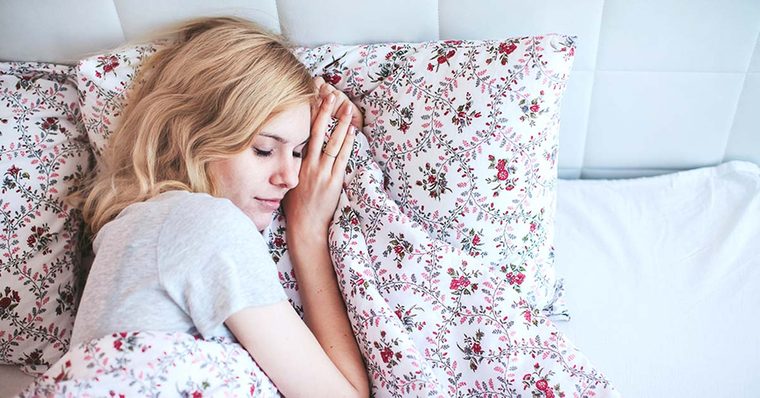
Your heart rate drops
“One of the possible functions of sleep is to give the heart a chance to rest from the constant demands of waking life,” says the Harvard Division of Sleep Medicine. When you rest, your body doesn’t need to work as hard, so your cardiovascular system slow down, particularly during NREM sleep. Don’t miss these 13 secrets to better sleep that doctors want you to know.
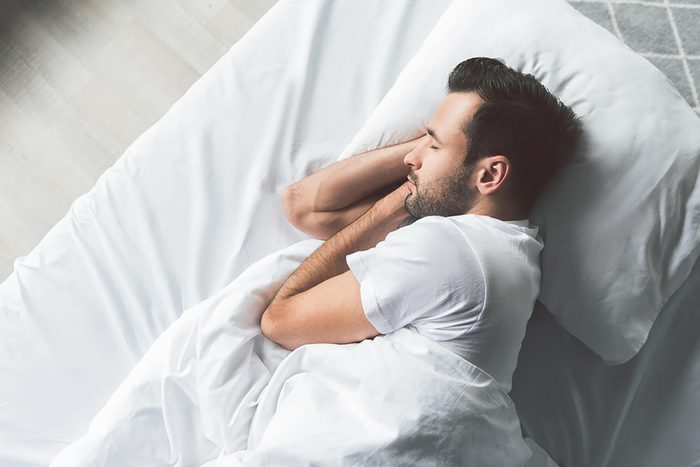
Your temperature drops
When you are awake, a process called thermoregulation controls your body temperatures by shivering, sweating, and changes in blood flow to make sure that your body temperature doesn’t fluctuate too much. However, during sleep your body temperature is reduced by 1 to 2 degrees Fahrenheit. It’s believed that sleep helps your body conserve energy.
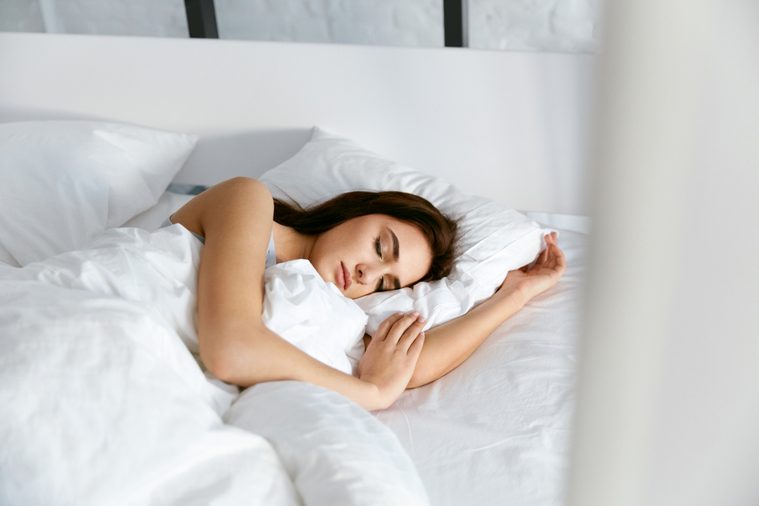
Your skin produces more collagen
During sleep, there’s an increase in certain body processes linked to cell repair and growth, including that of the collagen in your skin. This is largely due to an increase in the release of growth hormone, which also stimulates collagen production. No wonder why they call it beauty sleep! Make sure you know these natural sleep remedies that actually work.
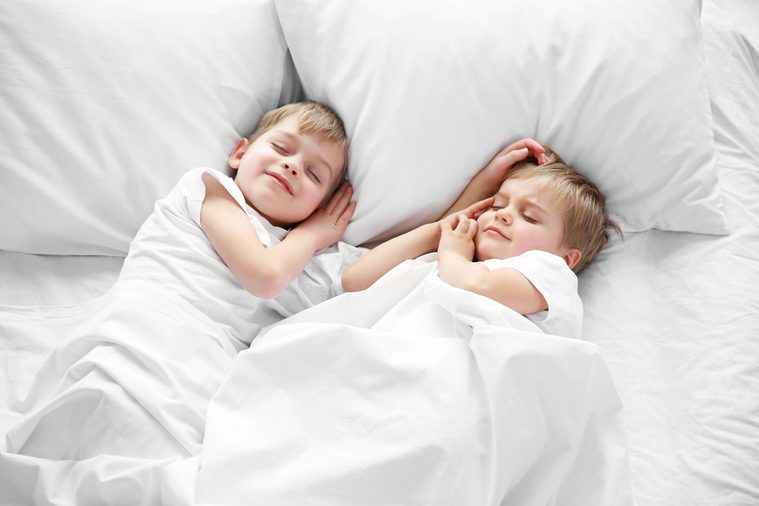
You get a little taller
You increase in height because the discs in your spine rehydrate without the weight of your body weight pressing down on them, which is what happens when you stand up.
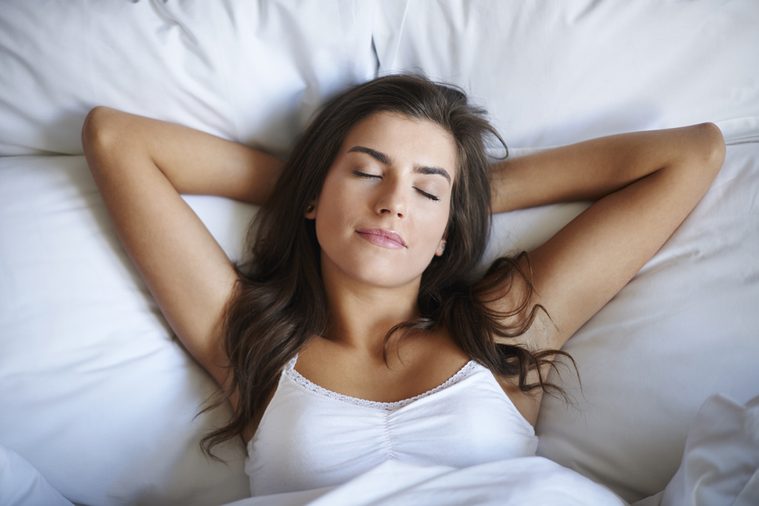
You forget useless information
Your brain works to clean house while you sleep, meaning any useless details leave, making room for future information. Two studies, both published in the journal Science, found that the brain disposes of old memories while you sleep through synapses. That’s because synapses—the neural connections brains form as they learn—are where we store and build new memories, the New York Times reports. According to the studies, during sleep, synapses are cut down, therefore making more room in your brain. Here are more awesome things your brain does while you sleep.
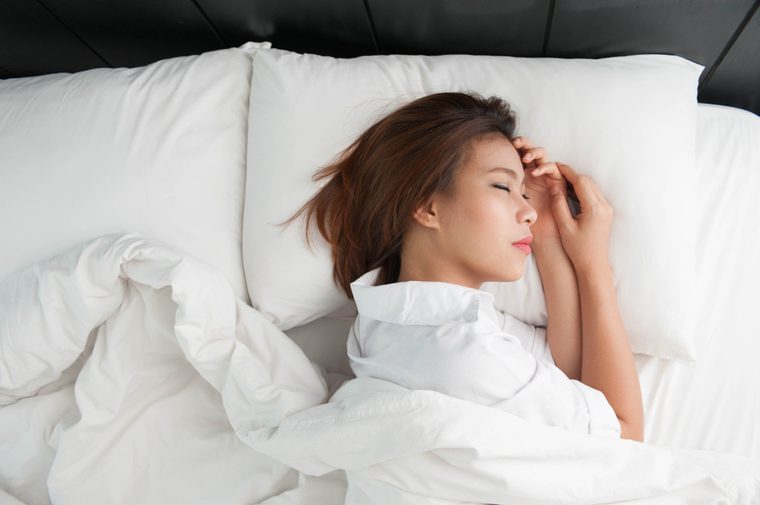
You grind your teeth and clench your jaw
Grinding and clenching your teeth during sleep is bruxism. The grinding is linked to stress, and you may not even realize you’re doing it in your sleep, according to Best Health. Unexplained facial pain, earaches, or tenderness near the jaw could be signs you are grinding unknowingly. Bruxism can lead to issues with your teeth, jaw, and joints. Plus, the habit can increase tooth sensitivity and, in some cases, chip or break teeth. This is what your other sleep habits are trying to tell you.

You can have exploding head syndrome
No, your brain doesn’t literally explode if you experience this syndrome. According to the American Sleep Association (ASA), people suffering from the disorder hear perceived, loud noises when going to sleep or waking up. These could be an explosion, crash, or even a gunshot, the ASA reports. Although there is no solidified cause for the syndrome, scientists speculate minor seizures, stress, and anxiety, or neuronal dysfunction could be to blame, per the ASA. Next, find out what happens to your body when you get too much sleep.